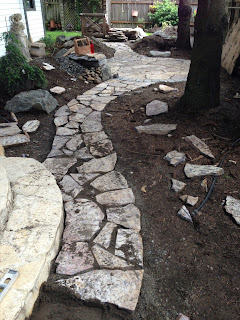This is my first stab at placing flagstone so I wasn't too sure what to expect but I was really looking forward to the results. That in itself would be enough motivation to get this segment of the project rolling.
The patio will be 11' in diameter and be the central focus of the landscape project. I am using Three Rivers rock out of the Sawtooth mountain range in Idaho, with black basalt pavers at the circumference giving it a bit of a framed look.
 |
| After digging and redigging to get the required 6" depth, I start with a metal post directly in the center as a reference point to ensure a true circular shape. |
 |
| The first layer consists of 3/4"-minus rock to serve as a base, about 3" to 4" thick. |
 |
| I use a 2x4 from the center post with a level attached to give a rough, flat starting point. |
 |
| I added multiple holes in the 2x4 for adjustment since the bench encroaches (on purpose) into the patio. |
 |
| More base for the center. |
 |
| After the 3/4"-minus is compacted (me jumping on a 12x24 piece of wood), I add the sand. Only about 1" to 1-1/2" is needed. |
 |
| I used a string tied to the center post for positioning, along with the level to start placing the black basalt pavers. |
 |
| I'd do a spot check every so often for levality as I made progress around the circumference. |
 |
| The circumference is completed. Time to rock and roll. |
 |
| Since the Three Rivers flagstone was about 1-1/2" thick, I just used a 2x4 below the original 2x4 guide to level the sand. |
 |
| I'm not sure what sort inherited strength I got to move that huge first piece, but I still had all my toes at the end which was good. |
 |
| The first several pieces were easy to fit in. Near the end, I had to do a lot of cutting with a 4" grinder saw. Just ask my neighbors - they can tell you how much cutting I had to do. |
 |
| This is a good shot showing the various colors of the Three Rivers stand up rock, as the call it. |
 |
| Passed inspection. Barely. |

























